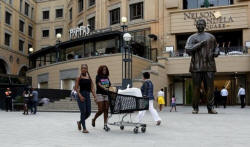|
 Rising
South African inflation outlook lifts case for rate
hikes: Reuters poll Rising
South African inflation outlook lifts case for rate
hikes: Reuters poll
 Send a link to a friend
Send a link to a friend
[February 11, 2016]
By Vuyani Ndaba
JOHANNESBURG (Reuters) - South Africa's
Reserve Bank is set to continue raising interest rates modestly in
coming months as the worst drought in a century and a weaker rand ramps
up the outlook for inflation, a Reuters poll found.
|
|
 The Reserve Bank already decisively front-loaded its repo rate by
hiking 50 basis points to 6.75 percent in January to tackle the
threat of higher inflation it highlighted last month. The Reserve Bank already decisively front-loaded its repo rate by
hiking 50 basis points to 6.75 percent in January to tackle the
threat of higher inflation it highlighted last month.
However, the next hikes are set to be the usual moderate increment
of 25 basis points. After starting in May, the Bank will then add
the same again in the third quarter, leaving it at 7.25 percent to
the end of the year, according to the poll.
Key to the local repo rate and rand outlook is the pace at which the
United States Federal Reserve raises its own rates. Higher rates in
the U.S. could boost the dollar even more, leaving emerging market
currencies like the rand under more pressure.

But testimony from Fed Chair Janet Yellen on Wednesday suggested it
might be a while before the next rate hike, even though trouble in
financial markets is not likely to reverse its plans to tighten
further this year.
In the meantime, the average rate of consumer inflation in South
Africa is expected to quicken to 6.4 percent this year, 0.4
percentage point higher than the January consensus. The Reserve Bank
wants inflation within a 3-6 percent target range.
"We see such high inflation this year from the worrying mix of
historic foreign exchange pass-through as businesses cannot compress
margins any more," said Peter Attard Montalto, emerging market
economist at Nomura International.
[to top of second column] |

Electricity price increases, higher real wage growth and the drought
causing waves of food price pressures were additional concerns, he
said.
Economic growth is still forecast to be 0.9 percent this year. Next
year's performance is expected at 1.5 percent, 0.2 percentage points
lower than last month's consensus and well behind its potential.
Analysts listed softer commodity prices and electricity supply
shortages were expected to be the top risks to South Africa's growth
performance, followed by political upheaval, a credit rating
downgrade, and prolonged drought.
(Editing by Tom Heneghan)
[© 2016 Thomson Reuters. All rights
reserved.] Copyright 2016 Reuters. All rights reserved. This material may not be published,
broadcast, rewritten or redistributed.
 |